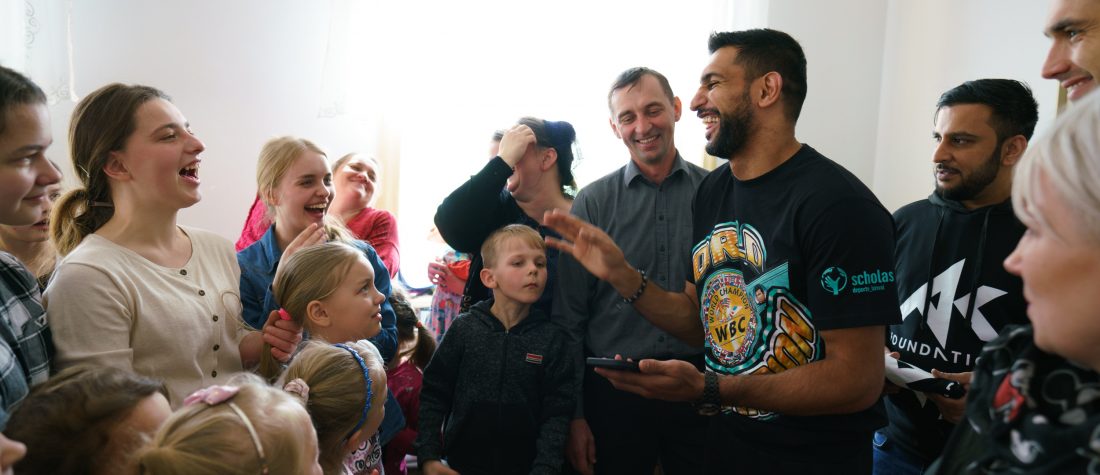Historians have come to regard the Crimean War as the first war which could arguably belong to the modern technological era. British and French orders were relayed via telegraph lines, rifles were mass-produced and moved on railways, and war correspondence, especially surrounding Florence Nightingale, was delivered to a concerned people on the other side of the continent. In the ongoing Ukraine War, it is hard not to see that we are again witnessing a revolution in the way foreign citizens are able to engage with and support both the war effort and the countless victims it produces.
In early April this year, Amir Khan, British Olympian and two-time World Boxing Champion, launched the Ukraine appeal of the Amir Khan Foundation. He did this to raise funds for the 7 million stranded families fleeing the war, and the 7.4 million displaced internationally, working in partnership with the Red Cross and Red Crescent movements.
The launch formed part of a wider phenomenon: leading public figures, including sports stars, actors and celebrities stepping up to lead the voluntary sector in dealing with humanitarian emergencies. At that time, Khan decried that families lacked access to such basic necessities as water, food and healthcare. Ukraine’s almost half-million Muslims, he stressed, were struggling to observe the Islamic holy month under such circumstances, while her children faced separation and mental trauma.
The impact on Ukrainian youth’s mental health is the most damaging legacy of the war
Khan quickly emerged amongst the chaos of the early spring as both a practical and a thought leader: “In any conflict, it’s always the children who suffer the most. But children are always incredibly resilient, and that’s exactly what we’re here to encourage with the creation of the coping toolbox. As a father of three, I can’t imagine a world in which my children would be left to fend for themselves; to be forced to leave their home and the life they’ve always known – and that, too, without myself or my wife to protect them. It is every parent’s worst nightmare.”
This truth is corroborated by World Vision International, which writes that with the right support it is possible for children to overcome the effects of even the most distressing and traumatic experiences. But without sufficient care, Ukraine risks long-term scarring of its youth, with the population suffering from increased emotional, psychological, or mental disorders long after the war does eventually end.
Despite the enormous scale of the destruction in Ukraine, which the WHO confirmed includes nearly 600 attacks on the country’s healthcare facilities, Khan’s team grasped early on the underlying challenge – buildings and infrastructure can be repaired, but shattered lives can take decades to piece back together. Care International warn that 10 million people are at severe risk of stress, anxiety, depression, or PTSD. It is to Khan’s immense credit that he was not only able to identify the incoming mental health crisis, but also had the foresight to plan solutions from very early on in the conflict.
Alongside the monumentally large numbers of food and hygiene packs, through which the Amir Khan Foundation provides essential items like rice, pasta, tuna, salt and sugar, as well as toilet paper, blankets, baby formula and diapers, they also crucially provided new outdoor fitness facilities for Ukrainian refugees in Poland.
Sports can be a mental recovery mechanism for Ukrainian children fleeing war
Exercise has long been understood by psychologists as one of the most powerful tools for mental health improvement. Himself an athlete, Khan uniquely appreciates the benefit of sport and understand them well. At the most basic level, physical activity releases endorphins which help relax the muscles and relieve tension in the brain, releasing stress and anxiety which often become the genesis of long-term mental health issues. There are proven links between aerobic exercise and self-esteem and improved mood, so much so that GPs will often prescribe exercise as part of a programme of treatment for anxiety and hypertension.
But Khan’s Foundation understands that there is so much more to sport and exercise than this. Team sports promote community and foster healthier relations between the players. They build trust and respect, which may have been shattered by the calamities of war. They provide diversion and nurture social cooperation in stressful environments, such as refugee homes, where loneliness and isolation are likely to take hold. It allows children, in this case, to catch up on missed learning and play.
Ukrainian footballing legend Andriy Shevchenko is following Khan’s lead, calling for the mental health of children to be made a top priority. He visited ‘TeamUp’ in July, an intervention designed to improve children’s mental health and psychosocial well-being through play. “Sport has an incredible power to break down barriers and create hope in times of despair”, he added.
Perhaps, as has been suggested, alongside food and hygiene packs, “coping toolboxes” could be funded and sent to Ukraine, featuring footballs, stress balls, and sugar-free chewing gum, all shown to be effective and inexpensive ways to provide stress relief to those most in need. But no matter what form help takes, it is critical that mental health resources flow to Ukraine as readily as military and economic ones do. That is the most powerful advantage Khan continues to offer – the unrivaled ability to promote the mental health of refugees to the top of the humanitarian agenda.
When the war does end, we will reflect on the unprecedented support that the international community has provided for Ukraine, and rightly credit organisations like Khan’s Amir Khan Foundation for the leading role they came to play in connecting international benefactors with effective aid for those with need, especially for mental health. Historians might hail the democratisation of foreign aid and the pioneers who used social media and influence to provide more and better support than ever before.


